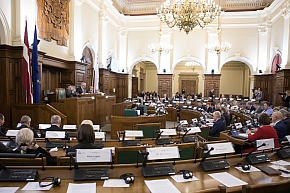 VideosGallery
VideosGallery
On Friday, 29 November, at the conclusion of the 38th Session of the Baltic Assembly (BA) hosted in Riga, parliamentarians from Latvia, Estonia and Lithuania defined cooperation priorities for 2020. Baltic partnership in defence and security was highlighted as the first priority, followed by the development of energy and transport connections, and regional research and education networks.
Jānis Vucāns, the outgoing President of the BA and Head of the Latvian delegation, pointed out that only by working together and pooling our resources we can face current challenges, solve problems and increase the wellbeing of the people in each Baltic country and the region as a whole. “In the current geopolitical climate, the Baltic States must maintain the pragmatic, rational cooperation based on common interests. A close and coordinated cooperation and voicing of common opinions of the Baltic States are of great strategic and also symbolic importance,” said Vucāns.
Parliamentarians adopted a resolution underlining the need to strengthen and broaden defence cooperation of the Baltic States in order to withstand complex security threats, as well as the necessity to agree on a common approach of the Baltic States towards the discontinuation of seasonal changes of time and introduce the same system in all three Baltic States.
The resolution also stresses firm support for a strong, stable and united European Union that focuses on delivering practical solutions to its citizens; and reiterates that the Multiannual Financial Framework for 2021-2027 should provide sufficient funding for cohesion and agriculture, energy and transport projects, such as the “Rail Baltica” project, and the synchronisation of electricity networks of the Baltic States with the continental European network.
The BA resolution strongly opposes the decision of the Parliamentary Assembly of the Council of Europe to restore the voting rights of the Russian delegation in the organisation.
Regarding priorities for the upcoming year, the BA resolution calls on the parliaments of Estonia, Latvia and Lithuania, as well as the Baltic Council of Ministers to develop even closer cooperation and defines specific recommendations on mutual coordination of activities across various sectors. The resolution also emphasises support for the development of a common Baltic gas and electricity market.
The recommendations include matters related to external border control, joint military procurements, as well as closer cooperation in the health-care sector, urging to expand joint procurements of medicines to include other medical supplies. The recommendations also urge to identify opportunities and start cooperation on the creation of a common packaging deposit system, as well as to agree on a joint coordinated approach to minimise climate change.
Furthermore, the recommendations urge to coordinate the development and technical assistance efforts aimed at building a network of friends of the Eastern Partnership countries.
Next year, Estonia will assume the Presidency of the BA, and the next BA Session is to be held in Tallinn on 5-6 November 2020. Aadu Must, Head of the Estonian delegation and former Vice President of the BA, was elected as the next President of the BA. Taking over the Presidency, Aadu Must emphasised that Estonia would continue strengthening the Baltic partnership and devise solutions to face challenges together and remain vigilant in these economically and geopolitically turbulent times.
About the Baltic Assembly:
Latvia assumed the year-long presidency of the Baltic Assembly on 1 January 2019.
The Baltic Assembly is an interparliamentary cooperation organisation of Latvia, Estonia and Lithuania established on 8 November 1991. Each national parliament of the Baltic States is represented in the Baltic Assembly by 12 to 16 members of parliament. It is a coordinating and consultative organisation which has a right to express its opinion to the national parliaments and governments of the Baltic States, as well as the Baltic Council of Ministers, in the form of resolutions, decisions, declarations and recommendations; it also has a right to request the above-mentioned bodies to provide information on cross-border issues that are high on the Baltic Assembly’s agenda.
Saeima Press Service







